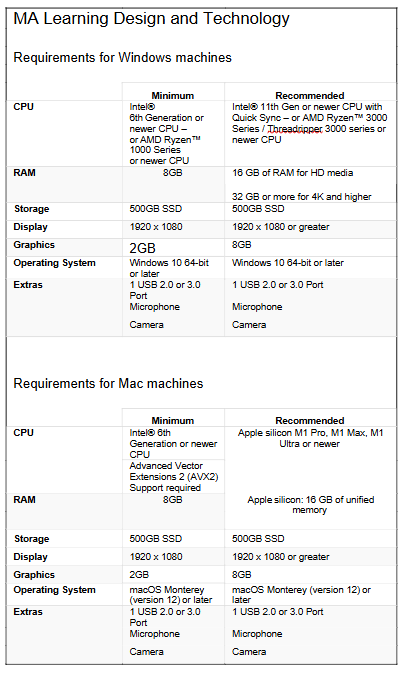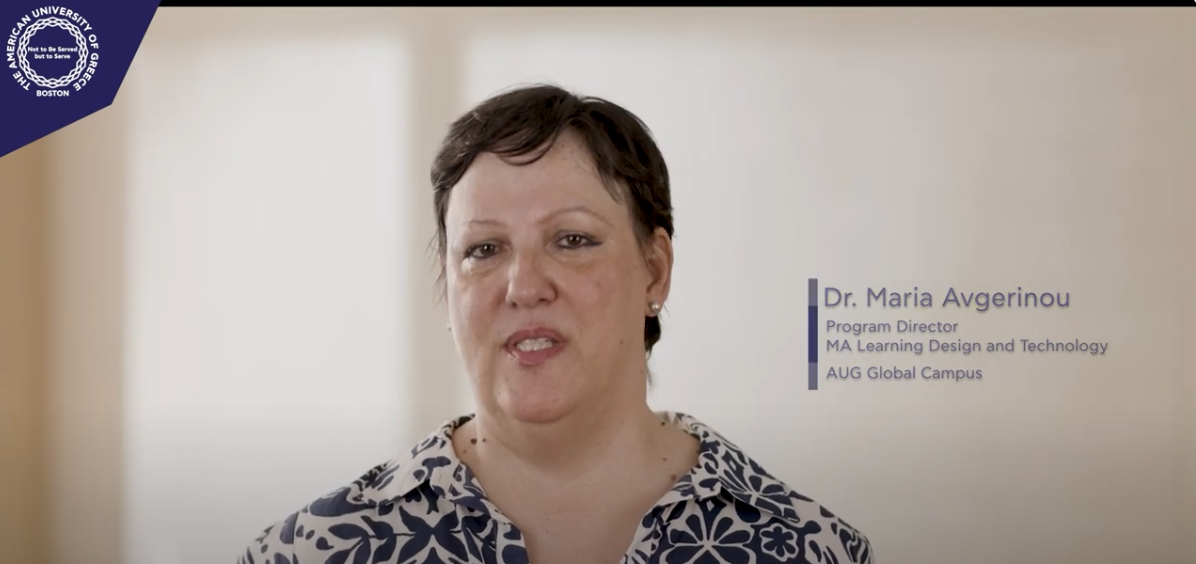
MA in Learning Design and Technology
GRADUATE
MA in Learning Design and Technology

APPLICATIONS
Now Open for Spring 2026
START DATE
April 2026
APPLICATION DEADLINE
Rolling Admissions
FEES
No Application Fee
$7,500 All-In MALDT
Tuition for our MALDT is $7,500.
Complete Your Degree in 15 months
Earn your MALDT fully online with a global faculty of industry experts — no GRE and no application fee required.
The world of education and corporate training is fundamentally changing through rapidly embracing online delivery and new technologies. The recent global trend towards online learning resulted in high demand for skilled learning and instructional designers. Demand is not just limited to schools, colleges and universities, but is also present in a growing number of businesses, training organizations and non-profits that recognize the permanent change in the way we work, train, teach and learn.
This major shift creates exciting career opportunities for those educators, adult trainers and professionals who possess expert skills in designing and delivering online education and training experiences and materials.
Designed with the needs of the working professionals of the 21st century in mind, this cutting-edge program is delivered fully online and aims at providing dynamic, hands-on learning experiences. Combining theory with practice, students gain in-depth knowledge of learning and instructional theories, as well as practical skills in the design and use of educational technologies.
Graduates of the program will be able to pursue careers as experts in the design, development, implementation, and evaluation of instructional resources to provide innovative, successful learning solutions that improve learning and performance in multiple environments, from government and corporate training settings to nonprofits, and traditional classrooms to conference rooms and informal learning environments.
As the demand for distance education and online workforce training is on the rise, the relevant, real-world skills acquired upon completion will be immediately utilized in the increasingly digitalized workplaces, both in Greece and abroad.
- Duration: One and a 1/2 year (full-time) or up to three years (part-time).
- Number of Courses: 10 courses (30 US credits).
- Course Delivery: 100% online
- Admission points: New students are admitted at the start of the fall, winter and spring terms.
"Despite being fully asynchronous, the MALDT program at AUGGC felt like a true community. The learner was always at the center—supported, challenged, and celebrated."
Apply Now | Request More Information

Welcome to the Master of Arts in Learning Design and Technology program at AUG Global Campus!
I’m delighted that you’re considering joining our dynamic program and community. In today’s rapidly evolving landscape, the demand for innovative, technology-driven learning solutions has never been greater, and I am honored to lead a program that prepares the next generation of leaders in this exciting field.
As the Program Director, I bring years of expertise in educational technology, instructional design, and the development of impactful digital learning solutions. My professional journey, which includes spearheading innovative projects and conducting research to enhance learning experiences, has informed every aspect of this program’s design. Together with our talented faculty, I am committed to ensuring that you graduate with the skills, confidence, and knowledge to excel in the ever-changing world of learning design and technology.
The MA in Learning Design and Technology program is thoughtfully structured to offer a unique blend of theory and practice. You will master cutting-edge tools and methodologies to design effective, user-centered digital learning experiences while gaining the leadership and strategic skills needed to drive meaningful change in educational and corporate environments. Our faculty members are industry leaders and seasoned practitioners who bring their real-world insights directly into your learning experience, covering topics such as learning analytics, instructional design, e-learning systems, and emerging educational technologies.
This program is designed to fit seamlessly into your life. Delivered 100% online, the MA in Learning Design and Technology program offers flexibility through an asynchronous format, allowing you to learn at your own pace while balancing professional and personal responsibilities. Despite being online, our program fosters a collaborative, supportive community that ensures you are never learning alone.
At AUG Global Campus, we are dedicated to your success and passionate about preparing you to make a lasting impact in the world of education and training. Thank you for considering this transformative journey with us. I look forward to welcoming you into a vibrant community of learners, innovators, and leaders eager to shape the future of learning.
Warm regards,
Dr. Maria Avgerinou
Program Director, MA in Learning Design and Technology
AUG Global Campus
Required Courses
- Foundations of Learning Design and Technology
- In this course, students will be presented with historical views and core perspectives of learning and cognition as they apply to a variety of contexts, such as learning environments, learning technologies, and emerging field directions. A combination of analysis, discussion, and practical application will lead to the development of skills needed to design successful learning experiences with meaningful technology integration. Examining how the understanding of learning has evolved and is currently viewed helps designers predict and support the needs of current and future learners.
- Theories and Strategies of Learning
- In this course, students will be presented with historical views and core perspectives of learning and cognition as they apply to a variety of contexts, such as learning environments, learning technologies, and emerging field directions. A combination of analysis, discussion, and practical application will lead to the development of skills needed to design successful learning experiences with meaningful technology integration. Examining how the understanding of learning has evolved and is currently viewed helps designers predict and support the needs of current and future learners.
- Learning Design and Development
- This hands-on course guides students through a dual learning design development and project management process. Students will work on needs analysis and design objectives, strategies, and assessments that are aligned with the target training module or course. They will justify the choice of strategies, media, and tools, and develop related original materials that incorporate technology meaningfully. They will also reflect on planning for resource development, delivery, implementation, project management, and evaluation of the learning design. The course aims at helping students produce authentic learning-based solutions while implementing ID and project management models and theories.
- Research Methods in Education and Training
- In this course, learners explore the qualitative, quantitative and mixed methods research methodologies commonly used in the learning sciences (education) and training, focusing on the integration of theory and practice, and ultimately drawing on data to arrive at research-informed decisions both as research designers, and as consumers of research. Students delve into a comprehensive exploration of several research paradigms, focusing on the processes and intricacies of research design, from formulating research questions, surveying the literature, and grappling with ethical considerations, to selecting appropriate methodologies, data collection methods, and analysis techniques relevant to the learning sciences. Students gain practical skills in scholarly writing, interpreting, and presenting research findings, with a focus on applying research insights to real-world challenges in educational and training settings. Collaborative projects foster teamwork, ensuring students develop the expertise needed to contribute meaningfully to the field of learning sciences research.
- Multimedia Environments
- In this course, learners will examine multimedia design principles and tools that developers and learning designers typically use to deliver computer-based, innovative solutions. Learners will apply principles of visual literacy and visual communication, thus gaining practical experience with text, graphics, and web design (with audio, video, and screen capturing) for the creation of authentic, interactive learning experiences. Accessibility and inclusive design, as well as multimedia issues (including copyright and licensing for Open Educational Resources) will be discussed, and there will be numerous opportunities for students to perform evaluations of digital media technologies.
- Online Teaching and Learning
- The course presents fundamental concepts, principles, models and research-based best practices for the effective instructional design, and the use of technology in online education and training programs. It focuses on the knowledge, skills, and dispositions of the online teacher, as well as the characteristics and needs of the online learner. The design, implementation and assessment of online learning is addressed through various case-based opportunities and innovative pedagogical approaches. Current trends and future directions in online teaching and learning research are also shared.
- Developing Learning Experiences with Design Thinking
- This hands-on course provides an overview of the powerful, creative process of design thinking as a problem-solving approach within the context of learning and training. Participants will be exposed to the principles of design thinking and will explore the effectiveness of this process when the goal is innovation. Real-world examples will be discussed, revealing how the design thinking process can enhance learning while addressing systemic change. Students will have the chance to implement design thinking in their professional environment, in order to solve a problem related to their own work practice.
- Managing Distance Education
- In this course, learners will explore core concepts, technologies, and issues related to the design, development, and delivery of adult learning and training at a distance. Specifically, learners will gain knowledge on factors that influence learning and training in adults and the relationship of these factors to distance education theories. Learners will also focus on effective leadership and change management techniques and they will consider strategy, planning, policy, and resourcing issues to lead change in distance learning and training environments.
- Learning Analytics
- In this course, learners explore the theoretical foundations and practical use of learning analytics in educational and training contexts. Through the deep understanding and interpretation of learning data, learners assess student engagement and learning outcomes and enhance teaching practices. Learners gain hands-on experience as they focus on understanding the ways in which learning analytics can be used to develop experiences, support learners, and predict success.
Practicum Track or Thesis Track
- Capstone Project or Portfolio or Thesis Track
- This course serves as the culminating experience of the program, allowing learners to synthesize and integrate knowledge, skills, and creativity acquired throughout their LD&T coursework. Students demonstrate their educational growth, professional proficiency, and readiness for real-world challenges by creating a comprehensive capstone product of personal or professional interest. This product may take the form of a practical project addressing an authentic learning or performance problem, or a portfolio showcasing selected work, reflective synthesis, a personal learning design philosophy, and a peer-review contribution. Both options are designed to exhibit mastery in Learning Design and Technology, align with program outcomes and students’ professional goals, and be utilized beyond the end of the program as a manifestation to prospective employers of integrated learning from their coursework, and of the level and range of their professional skills and practice.
Technology Requirements:

Upon successful completion of this program, students should be able to:
- Explain the principles and concepts that drive effective learning design, how they align with theory, and how they interface with the current trends and issues of the field.
- Evaluate and develop learning design solutions for education and/or industry contexts that are supported by current research in learning, training, and educational technologies.
- Identify criteria relevant to the evaluation, adoption, and integration of a range of technologies to adequately serve the needs of different learning and training contexts.
- Generate learning designs that are inclusive, meet the needs of diverse stakeholders, and are based on design thinking and data from learner analysis, assessment, and evaluation.
- Use analysis, synthesis, interpretation, and problem-solving skills to develop effective, ethical, and innovative applications of educational technologies
- Design, conduct, and analyze appropriate process and product evaluation
- Employ a range of learning theories and research-based evidence to design, develop, deliver, and support learning and training activities, materials, courses, and programs
- Communicate effectively in written and oral formats with a variety of stakeholders (clients, subject matter experts, organizations, administration, upper management, etc.)
- Demonstrate effective task and project management skills
Click here to download the learning outcomes.
Our base tuition is highly competitive by North American standards, and we encourage students to explore a variety of funding options, including private loans, employer tuition benefits, and other financial resources.
$7,500
30 Credits at $250/credit
Complete in 15 - 24 months
The American University of Greece Global Campus (AUGGC) is proudly accredited by the New England Commission of Higher Education (NECHE) and authorized by the Massachusetts Board of Higher Education. As an international institution from a financial aid perspective, AUGGC students are not eligible for U.S. federal financial aid. However, we are committed to making high-quality, globally recognized education accessible and affordable.
Our admissions team is available to discuss payment plans and help you identify the best options for making your education at AUGGC a reality.
Ask your admissions rep about our Global Leadership and Alumni Awards
See here for more information: Paying for Your Education.
The program is geared towards early- and mid-career professionals from a variety of backgrounds. It is designed to serve the professional needs of the following groups:
- Educators and trainers at all levels (teachers, instructors and/or administrators) in formal (K12, Higher Ed) and informal learning settings (training centers, life-long learning), looking to move beyond the classroom.
- Learning and development (L&D) and human resources (HR) professionals.
- Business professionals involved in training and onboarding (from businesses and NGOs to public sector organizations and military).
- Current educational /learning technologists or consultants looking to upgrade their skill set.
- Graduates in the field of Information Technology (IT) such as IT specialists, education/training software developers, managers, et al. who wish to pursue a career in learning design.
- People looking to change careers.
This program will develop skills and provide tools for participants to pursue an impressively versatile and diverse array of careers in the fields of education or business, or to work as freelance learning design consultants.
After the completion of this program, students can pursue their careers as: Online Trainer, Learning/Instructional Designer, Education Program Manager, Course Developer, Learning Analyst, Academic Assessment Coordinator, Instructional Technology Specialist, Director of Center for Technology in Learning, Educational Program Designer, Learning Strategist, Instructional Design and Evaluation Specialist, Course builder, Instructional Systems’ Designer, Corporate Training Specialist, Training Director/Manager, Human Resource Specialist, Director of staff development Manager of staff training and development, e-Learning Instructor, e-learning Consultant. Graduates of the program may also pursue further academic study.
The American University of Greece Global Campus (AUGGC) is proudly accredited by the New England Commission of Higher Education (NECHE) and authorized by the Massachusetts Board of Higher Education. As an international institution from a financial aid perspective, AUGGC students are not eligible for U.S. federal financial aid. However, we are committed to making high-quality, globally recognized education accessible and affordable.
Our base tuition is highly competitive by North American standards, and we encourage students to explore a variety of funding options, including private loans, employer tuition benefits, and other financial resources.
Our admissions team is available to discuss payment plans and help you identify the best options for making your education at AUGGC a reality.
At the American University of Greece Global Campus, we consider a student’s lived experience. The admissions requirements below are guidelines.
The minimum graduate admission requirements are:
1. A bachelor’s degree in any discipline from an accredited institution with an average G.P.A. of 3.0 or better.
a. Applicants who do not meet the minimum criteria may be admitted to the program on conditional status if the institution perceives other strengths in their application (e.g., strong research or relevant work experience, or other outstanding achievements during the applicants’ undergraduate experience).
2. Motivation to undertake graduate-level study and work to also be determined by:
a.Two recommender’s contact information
b. A personal statement of approx. 500 words submitted with the application form
c. An interview is optional and under the discretion of the Admissions Committee
3. English Proficiency Requirement for Admission
The American University of Greece (AUG) Global Campus delivers all programs in English. To ensure student success in an online learning environment, applicants whose primary language is not English must demonstrate English proficiency through one of the following pathways:
1. Standardized English Language Tests
Applicants may submit official test scores meeting or exceeding the following minimum requirements:
- TOEFL iBT: 87
- IELTS Academic: 6.5
- Duolingo English Test: 125
- PTE Academic: 59
- Cambridge/Michigan/MSU English: Proficiency
Official test scores must be no more than two years old.
2. Previous Education in English
Applicants may be exempt from submitting test scores if they have completed:
-
A bachelor’s degree (or equivalent) from an accredited institution where English was the primary language of instruction.
-
At least two years of full-time secondary or postsecondary education in an English-speaking country or an institution where English is the primary language of instruction.
Applicants must provide official transcripts and, if necessary, documentation from the institution confirming English as the language of instruction.
3. Workplace Experience in an English-Speaking Environment
Applicants who have worked in an English-speaking professional setting for three or more years may submit:
-
A letter from their employer verifying their role and confirming English proficiency in professional communication.
-
A resume highlighting English-language experience in professional settings.
-
A personal statement describing how they have used English in their work and daily interactions.
Additional Considerations:
-
AUG Global Campus reserves the right to request an interview to further assess English proficiency.
-
Applicants who have completed international curricula such as the International Baccalaureate (IB) or British A-Levels in English may also qualify for an exemption.
-
For applicants who do not meet the minimum scores but are close, a case-by-case review may be conducted, particularly for those with strong academic backgrounds.
4. Identification in the form of: Birth Certificate or Passport (to determine scholarship level where applicable)
5. Completed online application
Note: American University of Greece Global Campus is not eligible for the United States of America Federal Aid.
Credit Transfer
Credit transfer from previously attended graduate degree programs of accredited institutions may be allowed at a maximum limit of 9 credits and will be examined on an individual basis.
-
Credit may be given for courses taken in the graduate program of an accredited institution;
-
The Program Coordinator, in consultation with the respective instructor, approves (or otherwise) the transfer on the basis of sufficient equivalence – in content, learning outcomes, and number of credits;
-
The cumulative index (CI) of the prospective transfer course must be at least 3.00 (or its equivalent);
-
No grades are assigned to courses accepted for transfer and those courses do not affect the student’s cumulative index (CI) at the College.
Note: American University of Greece Global Campus is not eligible for the United States of America Federal Aid.
Expert Faculty. Personalized Support.
Students in the MALDT program consistently praise the expertise and dedication of our faculty. With backgrounds in learning theory, instructional design, and digital education, our professors model best practices in online teaching and learning.
From detailed feedback and real-world project guidance to one-on-one mentoring, students feel seen, supported, and intellectually challenged. Faculty like Dr. Avgerinou, Dr. Stetson, Dr. Stefanou, and Dr. Karambelas are known for their rigorous yet student-centered approach—bringing theory to life while fostering creativity, critical thinking, and professional growth.
As one graduate put it:
“Their feedback wasn’t just timely—it was transformative. They created a space where I felt empowered to innovate, reflect, and lead.”
 Maria Avgerinou -- Full-time Faculty - School of Liberal Arts and Sciences, Learning Design and Technology
Maria Avgerinou -- Full-time Faculty - School of Liberal Arts and Sciences, Learning Design and Technology
 Ilias Hotzoglou -- Full-time Faculty - School of Liberal Arts and Sciences, Information Technology (IT)
Ilias Hotzoglou -- Full-time Faculty - School of Liberal Arts and Sciences, Information Technology (IT)
 Vassilia Stefanou -- Full-time Faculty - School of Business and Economics, Management Information Systems (MIS)
Vassilia Stefanou -- Full-time Faculty - School of Business and Economics, Management Information Systems (MIS)
.jpg) Susan Stetson-Tiligadas -- Full-time Faculty - English for Academic Purposes and Writing English for Academic Purposes (EAPP)
Susan Stetson-Tiligadas -- Full-time Faculty - English for Academic Purposes and Writing English for Academic Purposes (EAPP)
 Lara Backmann-Tabouratzis -- Part-time Faculty - School of Liberal Arts and Sciences, Learning Design and Technology
Lara Backmann-Tabouratzis -- Part-time Faculty - School of Liberal Arts and Sciences, Learning Design and Technology
.jpg) Antonios Karampelas -- Part-time Faculty - School of Liberal Arts and Sciences, Learning Design and Technology
Antonios Karampelas -- Part-time Faculty - School of Liberal Arts and Sciences, Learning Design and Technology
 Luca Botturi -- Part-time Faculty - School of Liberal Arts and Sciences, Learning Design and Technology
Luca Botturi -- Part-time Faculty - School of Liberal Arts and Sciences, Learning Design and Technology
 Maria Solomou -- Part-time Faculty - School of Liberal Arts and Sciences, Learning Design and Technology
Maria Solomou -- Part-time Faculty - School of Liberal Arts and Sciences, Learning Design and Technology
 Tim Green -- Part-time Faculty - School of Liberal Arts and Sciences, Learning Design and Technology
Tim Green -- Part-time Faculty - School of Liberal Arts and Sciences, Learning Design and Technology
 Dr. Apostolos Koutropoulos - Part-time Faculty - School of Liberal Arts and Sciences, Learning Design and Technology
Dr. Apostolos Koutropoulos - Part-time Faculty - School of Liberal Arts and Sciences, Learning Design and Technology
Liana: From Classical Pedagogy to Digital Learning Innovator

A seasoned educator in English and Classics, Liana pursued the MALDT at AUGGC to bridge traditional teaching with innovative online learning design. Her journey was sparked by the challenges of remote teaching during the pandemic, where she realized the urgent need for thoughtful, inclusive online education. The fully asynchronous MALDT program gave her the flexibility to balance studies with work while diving deep into instructional design, multimedia creation, and strategic learning development.
She credits her transformation to projects like designing a summer school training course and developing a multimedia learning hub for a museum. Liana now applies her skills as an academic advisor, with future aspirations in museum education and professional training. Her advice to prospective students: “This program is more than academic—it’s a catalyst for personal and professional evolution.”
Angelos: From Sociology Lecturer to Learning Experience Designer

Angelos joined the MALDT program to make a career pivot, bringing with him years of university-level teaching experience. What impressed him most was the expert faculty, hands-on projects, and a curriculum that modeled excellent online learning. The asynchronous design allowed him to continue working while transitioning into his new role.
The capstone project was his favorite—a comprehensive demonstration of everything he had learned. With support from faculty Angelos transitioned into a full-time Learning Experience Designer. “This program didn’t just teach me learning design—it showed me what outstanding learning design looks like.”
Human-AI Collaboration in Instructional Design
- AI-powered content generation and instructional prototyping
- Ethical frameworks for AI use in education
- Human-centered learning design in tech-enhanced environments
- Research-based approaches to online, blended, and workplace learning


